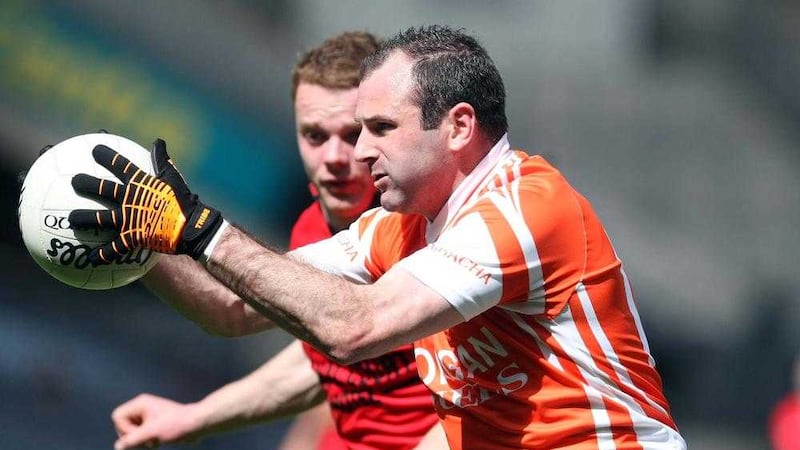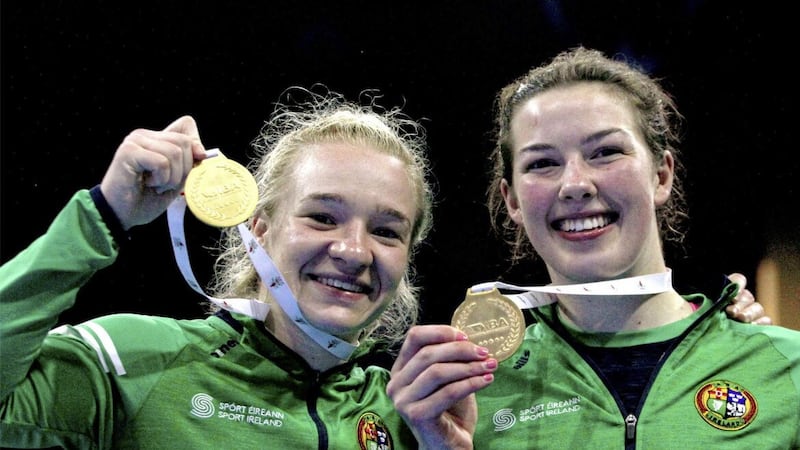I ENTERED sports journalism around the same time the Armagh senior footballers were starting to emerge as serious All-Ireland contenders.
I followed the respective careers of Stevie McDonnell, Oisin McConville, Diarmaid Marsden, Kieran McGeeney and others with great interest. As a team and as individuals, they were at their absolute peak. It’s coming 14 years since they won their one and only All-Ireland title.
Earlier this week, TG4’s hugely popular series Laochra Gael celebrated the sporting career of Stevie McDonnell. It was a fitting tribute to a class footballer and a brilliantly made programme with insightful contributions from Joe Kernan, Dara Ó Cinnéide, Ryan McMenamin and the man himself.
Laochra Gael has a habit of making you pause and reflect on different eras and great players of the past. Although I’d watched Stevie McDonnell play what felt like a thousand times from the press boxes of Croke Park, Clones and Crossmaglen across 12 or 13 seasons, you forget, quite literally, how good he was.
That’s why we need worthy programmes like Laochra Gael to remind us. It’s been a long time since I watched Aidan O’Rourke’s perfect diagonal pass in the 2002
All-Ireland final - which had the touch of the Dessie Ryans about it - that bounced into McDonnell’s arms and, without thinking, the ball left the Killeavy man’s left boot and sailed over Kerry’s crossbar to win the Sam Maguire.
McDonnell was something of an optical illusion on a football field - because he always managed to get away from defenders I assumed him to be a speedy forward. But Kieran McGeeney, a sprinter in his early days, used to goad McDonnell that he was one of the slowest forwards in the Armagh team. McGeeney also acknowledged that it was McDonnell’s razor-sharp turn that made him a brilliant taker of half-chances.
After McDonnell retired from inter-county football in April 2012, I interviewed him about his days with Armagh. He admitted McGeeney’s observation was indeed correct - but there was an important caveat.
“I remember the sprints at training and McGeeney would always beat me,” McDonnell said.
“I’m going to be totally honest, I was never the fastest player out there. ‘Geezer’ was deceptively fast, as were the two McEntees. They would have beaten me regularly in sprints. But it was my turn that got me away from defenders.”
He added: “When McGeeney did beat me in a sprint one thing I would always say to him: ‘Put a ball in front of us and you’ll not beat me to that.”
What Laochra Gael illustrated was McDonnell’s unerring ability to score with his so-called weaker left foot. He liked to feel a defender at his back because there was no better forward in the game who could flourish in the smallest areas of space. The less time McDonnell had, the better he became. He thrived on being tightly marked. All he needed was a half-yard. The fact that he could go right or left made him a nightmare for a defender to mark.
McDonnell was a man for all seasons. League or Championship, he displayed an insatiable appetite on a football field. In those days, Armagh were never a great National League team. On umpteen occasions, I watched Armagh struggle in NFL games in Crossmaglen and McDonnell would pop up with the winning score in the dying embers.
He did it so often that it couldn’t have been a fluke. In the 2003 All-Ireland semi-final, Donegal’s Niall McCready hadn’t given McDonnell a kick of the ball all afternoon. It was one of the best man-marking jobs you’d ever seen. And yet, it was McDonnell who caught a high ball over McCready in the latter stages and bagged the goal that won the game for Armagh.
McDonnell’s single greatest attribute was that, regardless of the circumstances, he was never out of the game. More than anything, his resilience was his best asset. As Joe Kernan acknowledged, the Killeavy man had tremendous mental strength.
The whole point of ‘sledging’ was to put your direct opponent off his game. To ‘sledge’ McDonnell had the opposite effect. It made him more determined to get the better of his man.
‘Ricey’ McMenamin of Tyrone was known to use verbals to break down his opponents. But he never applied the tactic against McDonnell when they met on the field. During the ‘Noughties’, the pair shared a few drinks at an awards ceremony and McDonnell happened to ask McMenamin why he never tried to use ‘verbals’ against him.
McMenamin replied: "Because I knew it would only make you better."
It’s been uttered a million times before - and is perilously close to reaching the realm of cliché - but it’s astonishing that Armagh team won just one All-Ireland title. Even allowing for Tyrone’s brilliance in the same era, for Armagh to only win one must have haunted Joe Kernan’s players in their early years of retirement. They will look back on ’04, ’05 and ’06 as missed opportunities. Armagh should have won three All-Ireland titles.
It’s only when you survey other forward lines in today’s game you realise just how good Armagh had it in the early ‘Noughties’. They had scandalous attacking talent. Oisin McConville, Diarmaid Marsden, Stevie McDonnell, Ronan Clarke and John McEntee all playing at their peak.
If you could take one of those players and parachute them into the current Orchard forward line, the team would be transformed. That’s how good that group was. McDonnell was still raging against the dying light in 2008 and helped deliver another Ulster title that summer.
Defensive systems may have become further refined since McDonnell retired four years ago. As a consequence, a fatalistic attitude prevails among many of today’s forwards as they struggle to thrive in such claustrophobic surroundings.
But Conor McManus and Bernard Brogan are still able to thrive. And there’s no doubt Stevie McDonnell would have done too. No system or man-marker would be allowed to beat him. For he was Gaelic football’s ultimate competitor.
Fair play to Laochra Gael for reminding us of his greatness.








